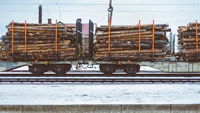 In some ways, logging insurance is like any other field of insurance for a blue collar workplace. Your big concerns are things like workers comp, general liability, contracting issues and so on. If you work in logging, you’ll encounter a number of factors and complications that you might not have to face erecting one story homes and remodeling office buildings, but generally speaking, if you’re familiar with something like construction insurance, then you’ll have an easy enough time adapting to timber logging insurance.
In some ways, logging insurance is like any other field of insurance for a blue collar workplace. Your big concerns are things like workers comp, general liability, contracting issues and so on. If you work in logging, you’ll encounter a number of factors and complications that you might not have to face erecting one story homes and remodeling office buildings, but generally speaking, if you’re familiar with something like construction insurance, then you’ll have an easy enough time adapting to timber logging insurance.
The key difference is owed to the environment in which your people will be working. A construction site is a relatively controlled environment. The forest brings with it a number of hazards that are trickier to manage and prepare for. Likewise, this environment brings us to the matter of transporting equipment and materials in and out of and through the forest. A construction site is stationary. Once you move your equipment in, most of it is where it’s going to be until the project is finished. A logging team is eventually going to run out of lumber in one area, and they’re going to move on to the next.
Many of the policies and provisions that a logger will buy are the same that a construction company would purchase, but they may be more extensive for the logger, for instance:
- Pollution. The logging industry is often targeted by environmentalist groups, meaning that without adequate pollution insurance, you’re asking for a scandal.
- Loading and unloading liability. Your crew is migratory, they’re going to be doing a lot of loading and unloading, meaning that the chances of dropping a toolbox on your foot is multiplied at every stop.
- Power line damage. Put simply: You’re knocking big trees over. It’s not unheard of for one of them to fall right onto a power line.
- Fire damage. Your team is creating just as much kindling as they are lumber.
- Accidental overcut. It happens: Your crew gets a couple of maps mixed up and they wind up chopping wood on someone else’s tract. Accidental overcut insurance protects you from any losses you’d incur over this.
Some mills offer rewards to logging companies that come with a robust logging contractors liability policy and a top-tier workforce simply because it’s safer for everyone involved in the deal when all bases are covered. Logging can be a very rewarding industry, but mistakes can be very expensive without the right coverage.





